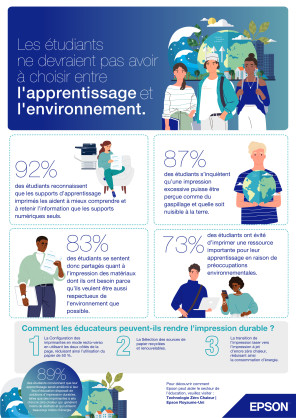On the sidelines of its participation in GITEX AFRICA 2024 (www.GITEXAfrica.com), Epson held a press conference where it unveiled the results of recent research it conducted in Europe, the Middle East and Africa, highlighting the common challenges faced in the Education and Healthcare sectors due to inefficient and unsustainable printing technology.
To meet these challenges, Epson remains committed to providing increasingly innovative, efficient and sustainable printing solutions. The impact of printing on student learning and healthcare staff efficiency is crucial.
Students need printed materials for their learning, but it’s equally important that this printing is both efficient and environmentally friendly. This enables them to access quality educational resources while integrating responsible practices. Similarly, for healthcare staff, having efficient and sustainable printing solutions saves valuable time, which translates into greater efficiency in the delivery of care. This balance between operational efficiency and environmental sustainability in printing is the offering Epson brings to these two vital sectors to support both student learning and quality healthcare.
In the education sector, the vast majority of students (91%) in the MEA region (Turkey, Saudi Arabia, UAE, South Africa, Morocco, Tunisia, Egypt and Kenya) recognize that printed learning materials help them better understand and retain information. Despite this, they often feel conflicted because they fear that excessive printing is perceived as being harmful to the environment. Nonetheless, the study also showed that 89% of the same respondent students recognize that their learning would be improved if their educational institution had more sustainable printing solutions, such as Heat-Free inkjet printers, which consume less energy and produce less waste than laser printers.
In the health sector, workers in the MEA region lose 5850 hours each year, equating to 731 working days; due to slow or non-functional printers. This loss of time has a negative impact on patient care, leading to delays in updating patient records, booking appointments and sharing information. Healthcare workers are calling for action to improve printing technology and reduce interruptions.
92% of healthcare workers believe their IT department should provide faster, lower-maintenance printers to reduce the difficulties caused by printing interruptions.
Environmental concerns also come into play, with 83% of respondents agreeing that the environmental impact of unsustainable printers is a major concern for them personally.
“In both sectors, the use of Epson’s Heat-Free inkjet printing technology is presented as a sustainable solution. Heat-Free inkjet printers consume less energy than traditional laser printers, and require fewer moving parts and consumables. By switching to this technology, educational establishments and health services could not only improve their operational efficiency, but also help reduce their environmental impact. It would also meet students’ learning needs and improve patient outcomes, while reducing costs and increasing user satisfaction.” says Ilias Azzaoui, Epson General Manager – French-speaking Africa and DomCom.
Visitors can discover Epson solutions at stand 4C-40 in hall 4 of GITEX AFRICA, taking place from May 29 to 31, 2024.
Place Bab Jdid, Boulevard Al Yarmouk – Marrakech (opposite Mamounia Hotel).
Distributed by APO Group on behalf of GITEX Africa.
Media Contact:
Siham Zouggarh
Email: siham.zouggarh@briocommunication.com
Tel. : +212 663552985
Join us to discover our latest innovations, and don’t miss our next exhibition!
Morocco
Facebook: https://apo-opa.co/3VqesnV
Instagram: https://apo-opa.co/3wZXUKa
LinkedIn: https://apo-opa.co/3VqBqev
Tunisia
Instagram: https://apo-opa.co/3VpHBzD
About Epson:
Epson is a global technology leader dedicated to co-creating sustainability and enriching communities by leveraging its efficient, compact, and precision technologies and digital technologies to connect people, things, and information. The company is focused on solving societal issues through innovations in home and office printing, commercial and industrial printing, manufacturing, visual and lifestyle. Epson will become carbon negative and eliminate use of exhaustible underground resources such as oil and metal by 2050.
Led by the Japan-based Seiko Epson Corporation, the worldwide Epson Group generates annual sales of around JPY 1 trillion.
global.Epson.com/

